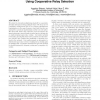Free Online Productivity Tools
i2Speak
i2Symbol
i2OCR
iTex2Img
iWeb2Print
iWeb2Shot
i2Type
iPdf2Split
iPdf2Merge
i2Bopomofo
i2Arabic
i2Style
i2Image
i2PDF
iLatex2Rtf
Sci2ools
IWCMC
2006
ACM
2006
ACM
Low complexity virtual antenna arrays using cooperative relay selection
We study the diversity-multiplexing tradeoff in cooperative diversity systems involving multiple relays. We focus on low complexity architectures that do not require simultaneous transmissions on the same frequency band and therefore are amenable to practical implementation with low-cost radios. We show that smart relay selection protocols achieve the same performance as previously proposed protocols that rely on multi-terminal space-time coding. Our study includes both analog and digital relays under a variety of relay selection criteria, and considers the availibility of decision feedback in the network. Our results present an alternative to distributed space-time codes for realizing the potential gains in multiple relay cooperative systems and open new avenues for fruitful interaction between routing and cooperative diversity. Categories and Subject Descriptors G.3 [Mathematics of Computing]: Probability and Statis
| Added | 14 Jun 2010 |
| Updated | 14 Jun 2010 |
| Type | Conference |
| Year | 2006 |
| Where | IWCMC |
| Authors | Aggelos Bletsas, Ashish Khisti, Moe Z. Win |
Comments (0)

